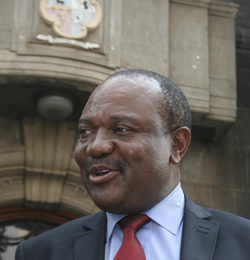
Harare City Council is working on bringing prepaid parking meters back into the central business district (CBD) to stop the prevailing massive pilferage and take advantage of the availability of coins, which allows for the use of meters.
BY TATIRA ZWINOIRA
Well-placed sources said last week that the local authority was losing as much as $50 000 per day through non-remittance of parking collections.
On a normal working day council should earn an average of $63 000, according to Zinara calculations.
On Saturdays, the figure is estimated to be about half that amount.
However, the city is getting an average of between $15 000 and $18 000 per working day while on Saturdays the money goes down to between $7 000 and $9 000.
The discrepancy was confirmed by several sources within council and other stakeholders who said instead of collecting $1,3 million per month, the local authority was getting a paltry $400 000 on average.
Former Zinara boss Albert Mugabe is also on record lamenting the massive theft of parking fees, saying the city was losing “a huge chunk” of money.
- Chamisa under fire over US$120K donation
- Mavhunga puts DeMbare into Chibuku quarterfinals
- Pension funds bet on Cabora Bassa oilfields
- Councils defy govt fire tender directive
Keep Reading
According to the source, the parking marshals under the employ of City Parking were about 330 at the end of 2016.
Council has about 7 000 parking bays.
City Parking general manager Simon Muzviyo did not respond to phone calls made by this paper.
Concerns over this loss of money has forced council and its subsidiary Harare Sunshine Holdings (HSH) to engage ZemQos Incorporated (Pvt) Limited to supply the prepaid parking meter machines.
Prepaid parking meter machines would be much safer from pilferage than the human controlled money collection system currently in place.
Although HSH CEO Alois Masepe could not be drawn into revealing details of the deal with ZemQos, he said plans had always been in place to bring back the meters.
“We are considering it [prepaid parking meters]; in fact, that is the system that we wanted but at that time there were no coins in the country,” he said.
“We were using paper money so the gadgets that you see the parking marshals having today is an alternative but the one we wanted was the prepaid parking meters so we are seized with that.”
Bond coins were introduced in late 2014, backed by a $50 million facility extended to the Reserve Bank of Zimbabwe by Afreximbank.
At the end of 2016, bond coins worth $15 million had been distributed into the market.
“The same suppliers [ZemQos] who supply the handheld devices used by parking marshals have got that system [prepaid machines] but they were useless in Zimbabwe because at that time we did not have coins,” Masepe said.
“Now that we have coins, we are seized with the issue of introducing meters in some streets.”
He said those employed as parking marshals would keep their jobs but their duties would be to monitor the prepaid machines.
“Those meters still need to be monitored. You still need people to monitor those meters,” Masepe said.
“The only difference is that they will not be accepting money.
“They will be there to monitor whether each car has paid. So you still need those people.
“We are seized with the idea and once we are ready, we will give the details.”
Prepaid parking meters in the CBD were phased out to make way for parking marshals who collect the cash directly from motorists using hand-held devices.
ZemQos, a provider of automated parking and enforcement systems, was engaged by City of Harare to supply these handheld terminals used by marshals.
Masepe said ZemQos would also be the sole supplier of prepaid parking meters and that once discussions were done, they would release details of the deal.
Council sources said City Parking collections were split into four lines, namely parking fees, parkades, prepayments and park rite meters.
ZemQos Incorporated operations manager Luke Mupingashato said the prepaid meters would allow motorists to pay the parking that they preferred once they were introduced.
“One will be able to get parking time even after paying as little as five cents, for five cents one will get three minutes parking time, for 10 cents one will get six minutes, for 25 cents one will get 15 minutes,” he said.
“The upgrade and enhancement entails installing Parking Meters of International standards, a perfect step in complementing City of Harare’s efforts to attain the World Class City status by 2025.
“The automated parking meters have components made internationally.
“However, the system implementation design and development is customer specific and as such, it is done here in Zimbabwe.”
ZemQos business analyst Calistas Machenyu said the upgrade and enhancement, installation of automated parking meters, afforded an opportunity for the re-alignment of the parking system in operation to be in tandem with the government policies.
“That is, wider use of local currency, plastic money, mobile money and ease of doing business,” he said. “The number of parking meters to be installed will be determined by the number of bays to be covered.”
Other reasons for the re-introduction of parking meters included the fact that parking meters would be ever present and the parking meter hardware had a long lifespan as compared to hand-held devices marshals currently used that needed to be replaced every two to three years.
Zinara acting chairman Wilfred Ramwi said he was unaware of the deal and, therefore, could not comment.










